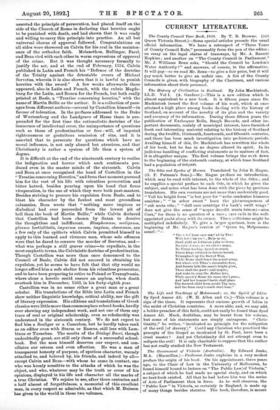The Odes and Epodes of Horace. Translated by John B.
Hague. (G. P. Putnam's Sons.)—Mr. Hague prefixes an introduction, which may be read with interest, to the whole of the Odes ; and he supplies a special preface to each Ode, in which he gives the subject, and notes what has been done with the piece by previous translators. His own versions are not more than moderately good. "Veil his bright form" is but poor for " nube candentes humeros amictus ; " "in arbor sweet" loses the picturesqueness of "sub arcta vite ; " "dull care outstrips a e bark's swift wings" does not give the sense of " neque decedit terata triretni—atra Cura," for there is no question of a race ; care rails in the well- appointed yacht along with its owner. These criticisms might be multiplied indefinitely. To give a larger specimen, here is the beginning of Mr. Hague's version of " Quem tie, Melpomene, semel : "— "The ru hour once marl ed by The3 With fi,v iring sm,le, Melp m me, Shall yield no Lthmian ram to fame, No char ' ct race, nn wr3stkr's name, No Victor leading, laurol.crawned, Fierce kings subdued in fetters bound, Triumphaut up the Sacred Way, While Rome shall boast the proud array. But where rich Tibur's streamleta flow, And forests hide the suns's bright glow. These shall the poet's soul inspire, And wake to soap the Molian lyre, While queenly Rome his name shall grace, And 'mid her honorei bards shall place Thy favored child from youth Thy care, And far from envy's reach shall bear."


































 Previous page
Previous page